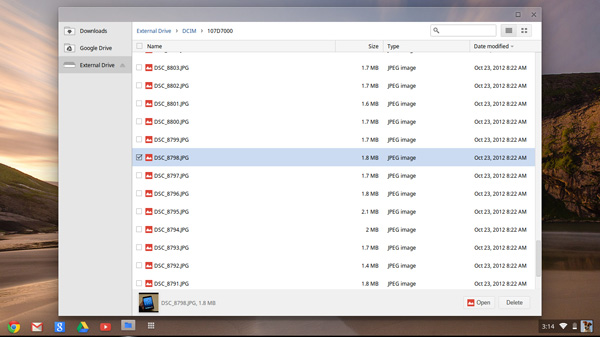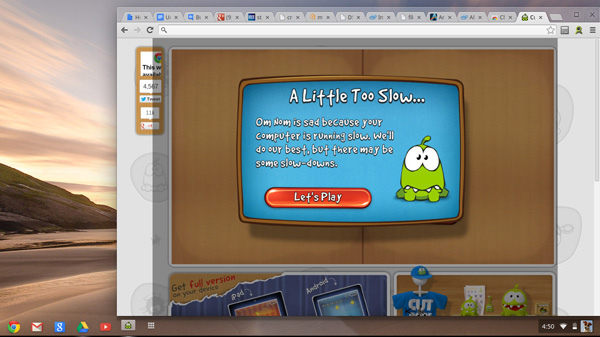Samsung Chromebook (XE303) Review: Testing ARM's Cortex A15
by Anand Lal Shimpi on October 31, 2012 9:00 AM ESTUser Experience & Usability
Similar to our performance analysis in the Surface review, there are really two sides to the performance of a Chromebook. There's the user experience as well as what the underlying hardware is capable of. I'll start with the user experience.
Chromebooks have never been all that robust when it comes to user experience. When Google first announced them they didn't even support mounting USB storage, although that has since been rectified. Although Google may have grand visions for where Chrome OS could go, today it serves one real purpose: to provide an affordable platform for a good web experience free of viruses and malware. To that end, the new Chromebook accomplishes its goal fairly well - as did the devices that came before it.
Chrome tends to be my favorite browser, and the experience maps fairly well the Chromebook platform. Web pages render properly and quickly (given the hardware that is). Compatibility isn't an issue. Everything just seems to work.
Obviously a major selling point of Chrome OS is that the web now allows for many content rich applications to be delivered directly in the browser rather than through a standalone executable. Google helps give access to these applications through the Chrome Web Store, although it's important to note that not all of them will run on the ARM based Chromebook (nor is there a good listing of those that will/won't run). The apps themselves vary in type from simple games to productivity tools. Many are quite functional, but the performance just isn't very good compared to a $500 tablet or even a $500 PC.
Technically the Chromebook can do a lot, but for anything other than browsing, YouTube and Google docs use I wouldn't get my hopes up. The heavier apps just don't run smoothly on the platform. Even web browsing isn't what I'd consider fast, but it's still acceptable. To put things in perspective, I got a performance warning trying to play Cut the Rope on the new Chromebook. Stability can also be a problem. Try to deviate too much from normal web browsing and you'll be greeted with long pauses and even system locks. For example, while testing WebGL performance on the new Chromebook I had to power cycle the machine after the browser became unresponsive. Normal web browsing is fine though.
There are other annoyances that aren't strictly performance related. For example, Netflix streaming won't work on the new Chromebook. Although image browsing support is native to the OS, there's no support for RAW camera files from a DSLR.
For the basic necessities however, the Chromebook does embody the fast enough computing concept. I researched, wrote and did almost all of my work while preparing this review on the Chromebook and generally found the experience acceptable. Other features like Pandora worked just fine (although I'd occasionally get hiccups in music playback if I loaded a particularly complex page). Whenever I'd switch back to my Ivy Bridge notebook I'd really appreciate the extra speed, but for writing and web browsing duties the Chromebook got the job done. Had Chrome OS been built around a lesser browser I don't think I would be as positive about the experience.












149 Comments
View All Comments
garfnodie - Thursday, November 15, 2012 - link
Let's see, Chromebook for $249, or Transformer w/ keyboard for $600. I'm guessing if you'r a broke college student who needs something simple, the Chromebook is looking pretty good.Myrandex - Wednesday, October 31, 2012 - link
Eh instead of the Nexus 10 + keyboard, Microsoft Surface all the way!Krysto - Thursday, November 1, 2012 - link
Why? I want a good high-res screen on my device if I'm going to $400, which is $100 cheaper and has the same amount of free storage as Surface.qwerty321 - Wednesday, March 20, 2013 - link
Not for long. When PNaCl is stabilised, ChromeOS users will be able to install native software. Obviously not Windows API stuff, but then who in their right mind would use that garbage anyway? There's a few things in the Chrome store experimenting with NaCl (the early, non-portable version) now.Midwayman - Wednesday, October 31, 2012 - link
I'm just a little shocked how how much the nexus 10 costs vs the chromebook. Clearly there is some price padding in the nexus 10 price.kllrnohj - Wednesday, October 31, 2012 - link
How do you figure? The two share a similar SoC, and nothing else. In particular the Nexus 10 has that incredibly gorgeous 2560x1600 IPS display, whereas this Chromebook has a mediocre, off the shelf 1366x768 TN display. Given that there's only a $150 difference between the two, the screen alone easily accounts for most of that. Similarly, the N10 is a smaller device - cramming the same stuff into a smaller form factor is typically harder and more expensive.Midwayman - Wednesday, October 31, 2012 - link
There aren't a lot of points of comparison with the Nexus 10 screen. Granted I'm sure the screen is more expensive, but similar size, similar SOC, same memory. Given the pricing trend with the nexus 7 and chromebook I expected a price around $50 less. Or at least to come with 32gb of memory for that price. I don't think $400 is a *bad* price, but it isn't as aggressive as I expected. I'm sure there will be a parts cost breakdown soon.Krysto - Wednesday, October 31, 2012 - link
Nexus 10 is a high-end tablet. Chromebook is a pretty low-end laptop, in all regards.sna19703 - Wednesday, October 31, 2012 - link
Get a Windows RT Tablet.kyuu - Thursday, November 1, 2012 - link
Once they release one with a better SoC than Tegra 3 and a 1600x900 screen or better, sure.